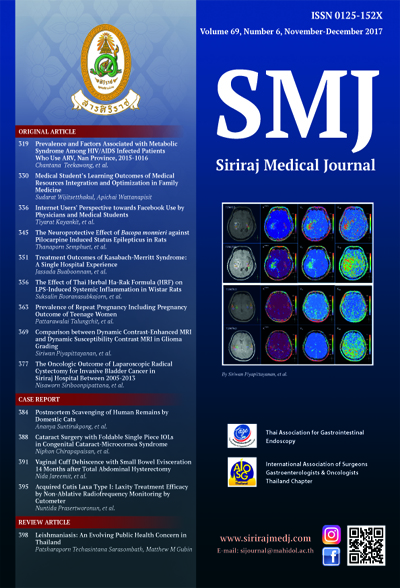The Oncologic Outcome of Laparoscopic Radical Cystectomy for Invasive Bladder Cancer in Siriraj Hospital Between 2005-2013
Keywords:
Bladder cancer; laparoscopic; radical cystectomy; oncologic outcomeAbstract
Objective: To determine the oncologic outcome of laparoscopic radical cystectomy for invasive bladder cancer in Siriraj Hospital.
Methods: A retrospective review of 57 patients with muscle invasive bladder cancer who underwent laparoscopic radical cystectomy in Siriraj Hospital from July 2005 to August 2013. Patient’s demographic data, intraoperative features, pathologic findings, early and late complications were all recorded. Five-year overall survival and 5-year cancer specific survival were evaluated by using Kaplan-Meier analysis.
Results: The mean age was 64 years with male/female ratio of 18:1. 47 patients had ileal conduit for urinary diversion (9 neobladder, 1 cutaneous ureterostomy). Extended lymph node dissection was performed in 19 patients (33%), the mean number of removed lymph nodes was 19 (range 6-37). The pathologic report of 50 patients (87.7%) showed high grade urothelial cell carcinoma, and 3 patients (5.3%) had concomitant adenocarcinoma of prostate. Altogether 29 patients had organ confined tumor (pT1-T2; 50.8%), 28 patients had non-organ confined tumor (pT3-T4; 49.2%), and 18 patients (31.6%) had lymph node involvement. Surgical margin was positive in 7 patients (12.3%). The most common early and late complications were urinary tract infection which responded to medical treatment. Seventy five percentile of follow-up time was 5.9 years, the 5-year overall survival was 69.6% in organ confined patient, 72.4% in extended lymph node dissection group, the 5-year cancer specific survival was 80.4% in organ confined patient, and 78.9% in extended lymph node dissection group. Twenty one patients died from bladder cancer, 10 patients died from other causes, and 26 patients were alive with no evidence of recurrence.
Conclusion: Radical cystectomy with lymph node dissection is the gold standard for invasive bladder cancer and laparoscopic approach is one of the effective alternative treatments with comparable oncologic outcome to open technique, T stage and extended lymph node dissection were the significant impact factors.
Downloads
Published
How to Cite
Issue
Section
License
Authors who publish with this journal agree to the following conditions:
Copyright Transfer
In submitting a manuscript, the authors acknowledge that the work will become the copyrighted property of Siriraj Medical Journal upon publication.
License
Articles are licensed under a Creative Commons Attribution-NonCommercial-NoDerivatives 4.0 International License (CC BY-NC-ND 4.0). This license allows for the sharing of the work for non-commercial purposes with proper attribution to the authors and the journal. However, it does not permit modifications or the creation of derivative works.
Sharing and Access
Authors are encouraged to share their article on their personal or institutional websites and through other non-commercial platforms. Doing so can increase readership and citations.











